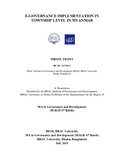| dc.contributor.advisor | Khair, Dr. Rizwan | |
| dc.contributor.author | Thant, Phone | |
| dc.date.accessioned | 2015-11-29T05:39:12Z | |
| dc.date.available | 2015-11-29T05:39:12Z | |
| dc.date.copyright | 2014 | |
| dc.date.issued | 2015-07 | |
| dc.identifier.other | ID 14272023 | |
| dc.identifier.uri | http://hdl.handle.net/10361/4659 | |
| dc.description | This thesis is submitted in partial fulfillment of the requirements for the degree of Masters of Arts in Governance and Development, 2014. | en_US |
| dc.description | Cataloged from PDF version of thesis report. | |
| dc.description | Includes bibliographical references (page 78 - 79). | |
| dc.description.abstract | At the edge of globalization and technological advancement, public sector administration has
to face an immense pressure. To cope with the mounting pressure the government has to be
prompt, responsive, transparent and citizen-centric. It is beyond doubt that ICT backed
government can ensure the desired services of the citizens and thus ICT integrated Egovernance
has become a fashionable phrase to articulate the citizens’ demand to a reality
creating values to their life. Keeping this in mind, the study has made an attempt to assess the
e-readiness level of Township Administration of “TAMU” as a functional unit of field level
bureaucracy from the perspective of both the officials and the beneficiaries. It has also
attempted to identify the major factors that hinder the e-readiness initiatives of “TAMU”
Township.
For the purpose of the study, primary data are collected by using questionnaire survey and
interview method. Then the findings from the primary data have been crossed verified with the
benchmark of the “UN Five Stage Model of E-Governance” to have an overall scenario of ereadiness
of Township Administration of “TAMU” Township. In the study lack of electricity,
human capital, lack of infrastructure and logistics, web presence and citizens’ perception of
beneficiaries are taken into consideration as independent variables for verifying the dependent
variable, E-governance Readiness. The study reveals that the capability of officials in using
computer is not up to the mark and their utilization level of computer facilities at workplace is
considerably low. Also their electricity distribution power is too low. In case of infrastructure
and logistics, it is found that the offices have not reasonable support of infrastructure and
logistics and the trend in using computer and internet by the employee is gradually low. So,
lack of infrastructure and logistics has deemed to be minimal effect on e-readiness at the field
level administration right now. As per web presence concerned, the study reveals that every
office has not website of its own. In context to perception of the beneficiaries, it is observed
that most of the beneficiaries or the citizens are aware of the need of use of ICTs in the public
administration. Nonetheless, they are found to be not satisfied in terms e-service delivery. The
overall level of E-governance readiness of Township Administration of “TAMU” is at the
Emerging stages of “UN Model”. This study comes up with some recommendations such as
increase electric power distribution, development of human capital, increasing of the speed of
Internet, and adopting arrangements for narrowing down the digital divide between the center and the periphery. | en_US |
| dc.description.statementofresponsibility | Phone Thant | |
| dc.format.extent | 89 pages | |
| dc.language.iso | en | en_US |
| dc.publisher | BRAC University | en_US |
| dc.rights | BRAC University dissertation are protected by copyright. They may be viewed from this source for any purpose, but reproduction or distribution in any format is prohibited without written permission. | |
| dc.subject | MAGD | en_US |
| dc.subject | E-governance | en_US |
| dc.subject | Mayanmar | en_US |
| dc.title | E-governance implementation in township level in Myanmar | en_US |
| dc.type | Thesis | en_US |
| dc.contributor.department | BRAC Institute of Governance and Development, BRAC University | |
| dc.description.degree | M. Governance and Development | |

